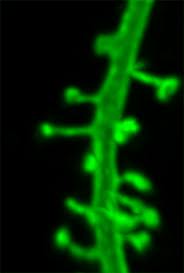 A recent UT Southwestern Medical Center study found that estrogen regulates energy expenditure, appetite and body weight, while insufficient estrogen receptors in specific parts of the brain may lead to obesity.
A recent UT Southwestern Medical Center study found that estrogen regulates energy expenditure, appetite and body weight, while insufficient estrogen receptors in specific parts of the brain may lead to obesity.
“Estrogen has a profound effect on metabolism,” said Dr. Deborah Clegg, associate professor of internal medicine and senior author of the study published Oct. 5 in Cell Metabolism. “We hadn’t previously thought of sex hormones as being critical regulators of food intake and body weight.”
The mouse study is the first to show that estrogen, acting through two hypothalamic neural centers in the brain, keeps female body weight in check by regulating hunger and energy expenditure. Female mice lacking estrogen receptor alpha – a molecule that sends estrogen signals to neurons – in those parts of the brain became obese and developed related diseases, such as diabetes and heart disease.
Similar results were not seen in male mice, although researchers suspect other unknown estrogen receptor sites in the brain play a similar role in regulating metabolism for males as well. Estrogen receptors are located throughout the body, but researchers found two specific populations of estrogen receptors that appear to regulate energy balance for female mice.
The findings are potentially important for millions of postmenopausal women, many of whom have decided against hormonal replacement therapy. The study could lead to new hormonal replacement therapies in which estrogen is delivered to specific parts of the brain that regulate body weight, thereby avoiding the risks associated with full-body estrogen delivery, such as breast cancer and stroke.
Doctors stopped routinely recommending long-term estrogen therapy for menopausal women in 2002 when a Women’s Health Initiative study showed the hormone did not prevent heart disease in women who already were at increased risk.
“The role of estrogen in postmenopausal women continues to remain uncertain,” Dr. Clegg said. “Current research is focused on the timing and the type of estrogen supplementation that would be most beneficial to women. Our findings further support a role for estrogens in regulating body weight and energy expenditure, suggesting a benefit of estrogen supplementation in postmenopausal women.”
Source: UT Southwestern Medical Center

 Recently, I attended the meeting of the North American Menopause Society (NAMS) in Washington DC along with 1500 other health professionals. The bottom line: Estrogen is not the devil, but it is not the panacea for all things female!
Recently, I attended the meeting of the North American Menopause Society (NAMS) in Washington DC along with 1500 other health professionals. The bottom line: Estrogen is not the devil, but it is not the panacea for all things female! Women, on average, live one-third of their lives post menopause. Some women find menopause an easy transition. Other women are chronically bothered by persistent hot flashes and night sweats that impact their quality of life. For years, hormone therapy was the answer but it has been shadowed by controversy as researchers learn more about estrogen and its long term impact on the body. The
Women, on average, live one-third of their lives post menopause. Some women find menopause an easy transition. Other women are chronically bothered by persistent hot flashes and night sweats that impact their quality of life. For years, hormone therapy was the answer but it has been shadowed by controversy as researchers learn more about estrogen and its long term impact on the body. The  Starting Hormone Therapy at Menopause Increases Breast Cancer Risk
Starting Hormone Therapy at Menopause Increases Breast Cancer Risk CHICAGO --- Estrogen is an elixir for the brain, sharpening mental performance in humans and animals and showing promise as a treatment for disorders of the brain such as Alzheimer’s disease and schizophrenia. But long-term estrogen therapy, once prescribed routinely for menopausal women, now is quite controversial because of research showing it increases the risk of cancer, heart disease and stroke.Northwestern Medicine researchers have discovered how to reap the benefits of estrogen without the risk. Using a special compound, they flipped a switch that mimics the effect of estrogen on cortical brain cells. The scientists also found how estrogen physically works in brain cells to boost mental performance, which had not been known.
CHICAGO --- Estrogen is an elixir for the brain, sharpening mental performance in humans and animals and showing promise as a treatment for disorders of the brain such as Alzheimer’s disease and schizophrenia. But long-term estrogen therapy, once prescribed routinely for menopausal women, now is quite controversial because of research showing it increases the risk of cancer, heart disease and stroke.Northwestern Medicine researchers have discovered how to reap the benefits of estrogen without the risk. Using a special compound, they flipped a switch that mimics the effect of estrogen on cortical brain cells. The scientists also found how estrogen physically works in brain cells to boost mental performance, which had not been known.
 Researchers at the University of Texas Southwestern Medical Center report that estrogen therapy after menopause increases a woman's chances of developing kidney stones. Kidney stones are common among postmenopausal women, affecting between 5% and 7% of the population in the U.S. Up until now, only observational studies have been done looking at kidney stones and estrogen, and the results have been conflicting. This study shows new evidence based on a randomized, placebo-controlled trial.
Researchers at the University of Texas Southwestern Medical Center report that estrogen therapy after menopause increases a woman's chances of developing kidney stones. Kidney stones are common among postmenopausal women, affecting between 5% and 7% of the population in the U.S. Up until now, only observational studies have been done looking at kidney stones and estrogen, and the results have been conflicting. This study shows new evidence based on a randomized, placebo-controlled trial.